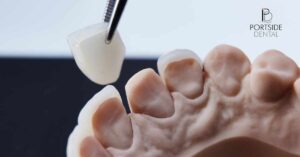Everyone wants a beautiful, healthy smile, and dental crowns can help us get and keep that smile. Modern dentistry is only complete with dental crowns, which help treat several dental problems.
One of the most compelling aspects of dental crowns is their ability to strengthen and protect damaged or weakened teeth and enhance their appearance.
What is a Dental Crown?
A dental crown, often called a cap, is a dental restoration custom-made to cover and encase a damaged, weakened, or aesthetically compromised tooth. Dental crowns are designed to restore the tooth’s shape, size, strength, and appearance while protecting it from further damage.
They are a versatile and commonly used dental solution with various types available, each made from different materials, catering to specific needs and preferences.
Related Articles:
How Long Do Porcelain Veneers Last?
Invisalign Vs Braces – Which is better for you?
Impact of Smoking and Vaping on Oral Health
Types of Dental Crowns
There are several varieties of dental crowns, each with a unique combination of features, benefits, and considerations.
Ceramic Crowns (All-Ceramic or All-Porcelain Crowns)
- Material: Ceramic crowns are crafted entirely from ceramic or porcelain materials.
- Advantages: They excel in aesthetics, closely mimicking the appearance of natural teeth. Moreover, they are biocompatible, making them suitable for patients with metal allergies.
- Considerations: While ceramic crowns shine in aesthetics, metal crowns may be more robust than they are, particularly when exposed to heavy chewing forces. Additionally, they are prone to wear over time, primarily if used for grinding or clenching.
Porcelain-Fused-to-Metal (PFM) Crowns
- Material: PFM crowns consist of a metal base, typically a high-noble alloy, covered with a layer of porcelain.
- Advantages: These crowns balance strength and aesthetics, making them versatile and suitable for front and back teeth. They also exhibit good durability and resistance to wear.
- Considerations: In rare cases, a thin metal line may be visible near the gumline, potentially affecting aesthetics. There is also a slight risk of porcelain chipping or wearing over time.

Metal Crowns
- Material: Metal crowns are usually crafted from high-noble metals like gold or silver or base metals like nickel-chromium.
- Advantages: Exceptional strength and durability make metal crowns ideal for molars subjected to heavy chewing forces. They also result in minimal wear on opposing teeth.
- Considerations: Despite their functional advantages, metal crowns may be less aesthetically pleasing due to their metallic appearance. Consequently, they might not be suitable for visible front teeth, where aesthetics are a top priority.
Zirconia Crowns
- Material: Zirconia crowns are constructed from zirconium oxide, a strong and durable ceramic material.They are tooth coloured.
- Advantages: These crowns have excellent strength and durability, making them suitable for front and back teeth. Moreover, they offer a natural appearance and outstanding aesthetics.
- Considerations: While zirconia crowns are tooth coloured, they may not be as aesthetic as other ceramic crowns.
Step-by-Step Dental Crown Procedure
Knowing what to expect from the dental crown treatment can help reduce anxiety. Here is a detailed explanation:
- Initial Consultation: Your dentist will first meet with you to discuss the journey. Your dentist will examine your tooth at this appointment and review your treatment choices. This is when the kind of crown that will best serve your needs will be decided.
- Tooth Preparation: The tooth in question will go through preparation after a decision has been reached. The injured tooth must be reshaped during this stage to make room for the crown. The dentist will remove any decayed or compromised tooth structure to guarantee a perfect fit.
- Impressions: The prepped tooth is accurately captured in a digital impression. Using these impressions as a guide, your bespoke crown will be made with an ideal fit and alignment.
- Temporary Crown Placement: A temporary crown is put on the prepared tooth while your custom crown is created. Protecting the tooth with this temporary crown prevents any sensitivity or discomfort.
- Crown Fabrication: Trained experts precisely craft your bespoke crown in a dental laboratory. They ensure that the final crown matches your natural teeth by using the digital impressions as a guide.
- Crown Placement and Bonding: It’s time to move on to the last step once your unique crown is completed. The temporary crown will be removed by your dentist, who will then firmly bond the new, permanent one in its place. This procedure guarantees a secure fit, a natural appearance, and the functionality of your tooth.
The cost of a crown can vary depending on individual factors such as the case’s complexity, and any additional procedures required, such as tooth extractions or root canal treatment. To obtain a precise cost estimate tailored to your unique dental needs and circumstances, it’s crucial to consult with our dentists.

The cost of dental crowns can vary based on the following factors:
- Material of the Crown: Different crown materials come with varying price points. Gold crowns can be more expensive due to the cost of the gold.
- Dental Lab Fees: High-quality dental labs may charge a premium for crafting custom crowns that match your natural teeth seamlessly.
- Dentist’s Expertise and Location: The experience and location of your dentist can impact the overall cost. Experienced dentists and those in urban areas may charge higher fees.
- Additional Procedures: In some cases, other dental procedures may be required alongside crown placement. These could include root canals, gum treatments, or extractions, and they will contribute to the overall cost.
- Dental Insurance Coverage: Dental insurance policies vary widely in terms of coverage for dental crowns. It is essential to review your insurance plan to determine if it covers any portion of the crown cost.
If you need dental crowns or are considering this treatment in Newport, Victoria, our experienced team of dentists is here to offer top-notch care and solutions tailored to your unique dental needs. Contact Portside Dental today to take the first step towards a healthier, more radiant smile.
With the proper dental care and your dentist’s expertise, you can look forward to a future filled with confident smiles and optimal oral health.


I like this blog very much, Its a really nice post to read and get info.Blog money